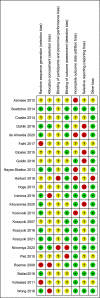A systematic review and meta-analysis of acceptance- and mindfulness-based interventions for DSM-5 anxiety disorders
- PMID: 34650179
- PMCID: PMC8516851
- DOI: 10.1038/s41598-021-99882-w
A systematic review and meta-analysis of acceptance- and mindfulness-based interventions for DSM-5 anxiety disorders
Abstract
This meta-analysis systematically reviewed the evidence on standardized acceptance-/mindfulness-based interventions in DSM-5 anxiety disorders. Randomized controlled trials examining Acceptance and Commitment Therapy (ACT), Mindfulness-Based Cognitive Therapy (MBCT), and Mindfulness-Based Stress Reduction (MBSR) were searched via PubMed, Central, PsycInfo, and Scopus until June 2021. Standardized mean differences (SMD) and 95% confidence intervals (CI) were calculated for primary outcomes (anxiety) and secondary ones (depression and quality of life). Risk of bias was assessed using the Cochrane tool. We found 23 studies, mostly of unclear risk of bias, including 1815 adults with different DSM-5 anxiety disorders. ACT, MBCT and MBSR led to short-term effects on clinician- and patient-rated anxiety in addition to treatment as usual (TAU) versus TAU alone. In comparison to Cognitive Behavioral Therapy (CBT), ACT and MBCT showed comparable effects on both anxiety outcomes, while MBSR showed significantly lower effects. Analyses up to 6 and 12 months did not reveal significant differences compared to TAU or CBT. Effects on depression and quality of life showed similar trends. Statistical heterogeneity was moderate to considerable. Adverse events were reported insufficiently. The evidence suggests short-term anxiolytic effects of acceptance- and mindfulness-based interventions. Specific treatment effects exceeding those of placebo mechanisms remain unclear. Protocol registry: Registered at Prospero on November 3rd, 2017 (CRD42017076810).
© 2021. The Author(s).
Conflict of interest statement
The authors declare no competing interests.
Figures



References
-
- American Psychiatric Association . Diagnostic and Statistical Manual of Mental Disorders, fifth edition (DSM-5) American Psychiatric Publishing; 2013.

